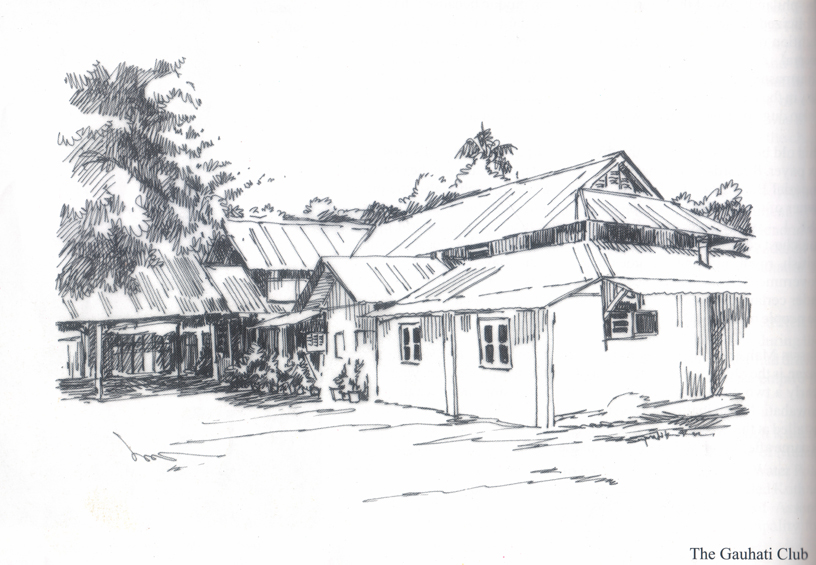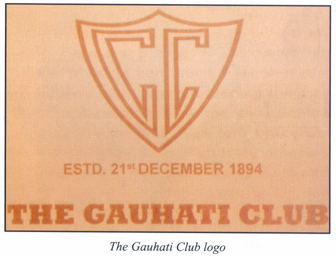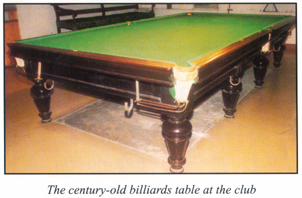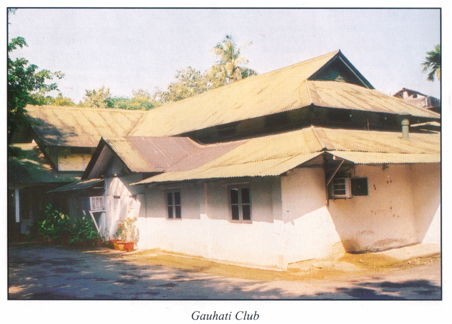| THE RETREAT |
 |
In the early days of the British Raj, Guwahati was a peaceful little town. The Brahmaputra flower by majestically, lining the surrounding blue hills with a silver splash and adding to its charm. The riverside was both beautiful and tranquil, and was the favorite of European officers. Quite naturally therefore when a club, christened the European Club of Gauhati, opened its doors in the winter of 1894, it was on the banks of the red river
|
Since the 1860s, station clubs, planters’ clubs or European clubs were a common feature across Assam. The clubs appealed to most British government officers, tea planters and other executives who were separated from their families for long years. Those who had their families with them also desired a common place for social gathering since they were virtually detached from the local community. The clubs served another very important purpose - - they were the first meeting place for young British officials stationed in town and unmarried young girls who came to India from England every winter.
|
|
The European Club of Guwahati, we may presume, was not an exception. It was full of fun and life. The members played bridge, billiards, table tennis, slosh, snooker, badminton and lawn tennis every day. Cultural evenings and fancy dress competitions were held frequently. Situated in the premises of the present judges’ bungalow, it also had three fishing boats anchored in the river for its members. For grass widowers who send their wives to England during the summers, the club and the holy water of Scotland was a balm for their loneliness. One interesting anecdote about the club dates back to a hot summer day in 1901 when FW Sudmerson’s disenchantment with the town unsettled club members so much that they took care to ensure regular supply of ice to his dak bungalow room to “cool him down”.
Of course no Indian was allowed to become member of the European Club of Guwahati. The only Indians allowed inside its premises were malis, cooks, attendants and two barbers. Later, a few Indians were allowed as half members but they were deprived of voting rights and many other privileges. It was this discriminatory attitude towards the Indians that led an elite section of Guwahati to start a parallel club, the India Club, in 1933.
|
|
During the freedom movement, the European Club became any eyesore for the nationalists. They considered it a symbol of imperialism. One chilly winter night in 1907 fire broke out in the club bungalow that was known to the common people as ‘anda bungla’. Despite best efforts the cause of fire could not be ascertained. After Independence, nationalist litterateur Ambikagiri Roychoudhury was to admit, “We destroyed the European Club by setting fire into it. To us it was a symbol of exploitation of our country. The building was razed to the ground. None realized what went wrong and we all laughed.” |
After the fire a new building was arranged to house the club, at the present site of the High Court. The character and facilities of the club remained the same, though a small golf course was added. Unfortunately for club site to house the Gauhati High Court and acquired the land for a compensation of Rs 1,21,603.15.
The burra sahibs of two prominent streamer companies, RSN Co and IGN Co who were operating in Guwahati now came forward to rescue the club from closure. They anchored two ‘steamer flats’ called Dilwara and Cashmere at
|
the Uzanbazar ghat to house the club. Unfortunately, a member who had one too many pegs one day slipped from the wooden plank that connected the two flats to his death. Unnerved by the incident members at once decided to opt for a new venue. Club President E S Kaye and members like C R S Hamilton, C L Weldon and D Skyes ultimately found a building with a sprawling lawn opposite the erstwhile Company Bagan area. The premise was taken on rent for Rs 250 a month. A billiards room, a bar and a card room were added to the building and the lawn was converted into a tennis court. Years later, it is from this rented premises that the club still functions. |
|
After Independence the club admitted the Indians as full members and S N Baruah, B C Das, Mahmud Ali and P P Duara were among the first to acquire the privilege. Justice Ramlabhaya became the first to acquire the privilege. Justice Ramlabhaya became the first Indian president of the club which was then renamed the Gauhati Club.


